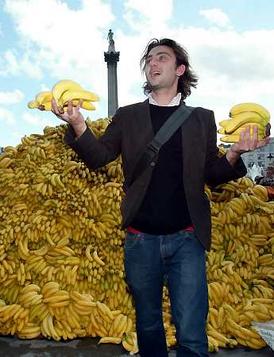







On Thursday, May 10th, I installed a gigantic mountain of bananas - well
over a ton of them - in the historic town square in Piotrkow Trybunalski in
Poland. The work, which was literally devoured by the crowd, was an
interactive commentary on greed, globalization, consumerism and violence
that vanished before the eyes - and down the gullets - of the audience
within minutes.
With references to the Incas (the myth of Atahualpa), the Nazis (to the
piles of looted possessions in the death camps), and predatory
multinationals like Dole and Del Monte, the installation examines the seedy
crossroads of personal and institutional desire, and questions the creation
of meaning - and the meaning of "creation," and consumption - in art in the
public context. Through the metaphor of eating as active participation, the
work investigates the history of brutality towards Poland's wartime Jewish
population, which was itself literally devoured and cannibalized. This is a
particularly powerful association in Piotrkow Trybunalski, the site of the
first Jewish ghetto in all of Nazi-occupied Europe. Yet more than anything,
the project is visually stunning - an enormous mound of green and golden
fruit, whittled away by the audience like a crazed collective sculptor.
Installed in Trybunalski Square in the beautiful Old Town of Piotrkow
Trybunalski, the project formed the cornerstone of the Festival
International INTERACTIONS III / INTERAKCJE 2001, one of Eastern Europe's
most cutting-edge performance art festivals.
The installation will be profiled in the upcoming edition of the Italian
contemporary art magazine TEMA CELESTE, and previous stagings in Latin
America in 1999 and 2000 have been featured in magazine and newspapers
around the world, including the NEW YORK PRESS, CIVILIZATION MAGAZINE,
PUBLIC ART REVIEW, JUXTAPOZ, ART NEXUS (Colombia), and A-N MAGAZINE (UK). In
addition, it will be featured in books in both Germany and the United States
in 2001, and the leading academic journal HOPSCOTCH, printed by Duke
University Press.
Como quien lanza tomates al escenario cuando le disgusta una función, el estadounidense Douglas Fishbone empleará 40.000 bananos para protestar contra la explotación que sufren los países productores de esa fruta -como Costa Rica- por parte de los compradores, como el suyo y los europeos.
La suya es una manifestación fuerte pero pacífica, una obra de arte conceptual, una instalación que empezará a construir mañana a mediodía frente al Museo de los Niños hasta lograr una gran montaña amarilla.
Atrevido, inquieto y con gran sentido crítico, el artista afirma que su obra es una metáfora del canibalismo en la economía mundial, precisamente ahora que la crisis agobia al sector bananero costarricense.
"A mí me da vergüenza ver la forma en que mi país abusa de los más pequeños. Allá la gente se come un banano y no se interesa en saber de dónde viene, las grandes corporaciones explotan la riqueza de un país y no se preocupan de lo que le pasa a las personas que la producen", manifiesta.
De fe judía, Fishbone tiene su residencia en Nueva York pero vivió casi dos años en Ecuador y allí presentó por primera vez su instalación de bananos. Según dice, conocer la realidad latinoamericana despertó en él una mayor sensibilidad hacia los problemas de la región.
El creador cuenta que su primer encuentro con las artes plásticas ocurrió hace apenas seis años, pues, en realidad, él estudió música.
"He tenido muchos trabajos extraños. Hice publicidad para Luciano Pavarotti, vendí textiles en Israel y hasta estuve tres meses en el ejército. Un día me puse a hacer modelos con arcilla y eso me obsesionó como a un niño, así empecé a hacer esculturas", narra.
Ahora, con 30 años de edad, el creador se dispone a seguir manifestándose mediante el arte. Y, como también critica el desperdicio, invita a todo el público para que no solo observe su obra, sino que también la pruebe y aproveche para llevar algunos bananos a su casa... hasta que se agoten los 40.000.
Fabiola
Martínez
fmartinez@nacion.co.cr
21/10.2004 Pomnik z bananów na Trafalgar Square


 JOHN D MCHUGH AP
JOHN D MCHUGH AP